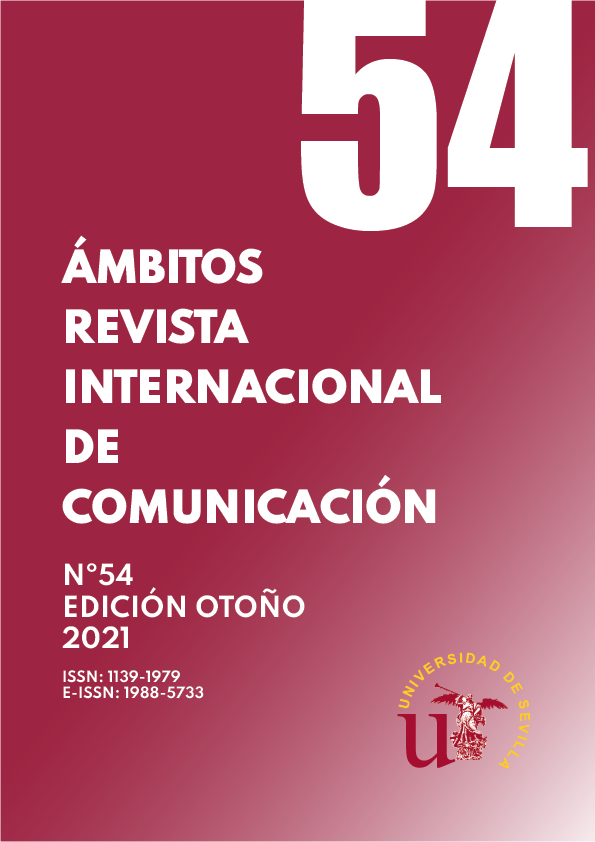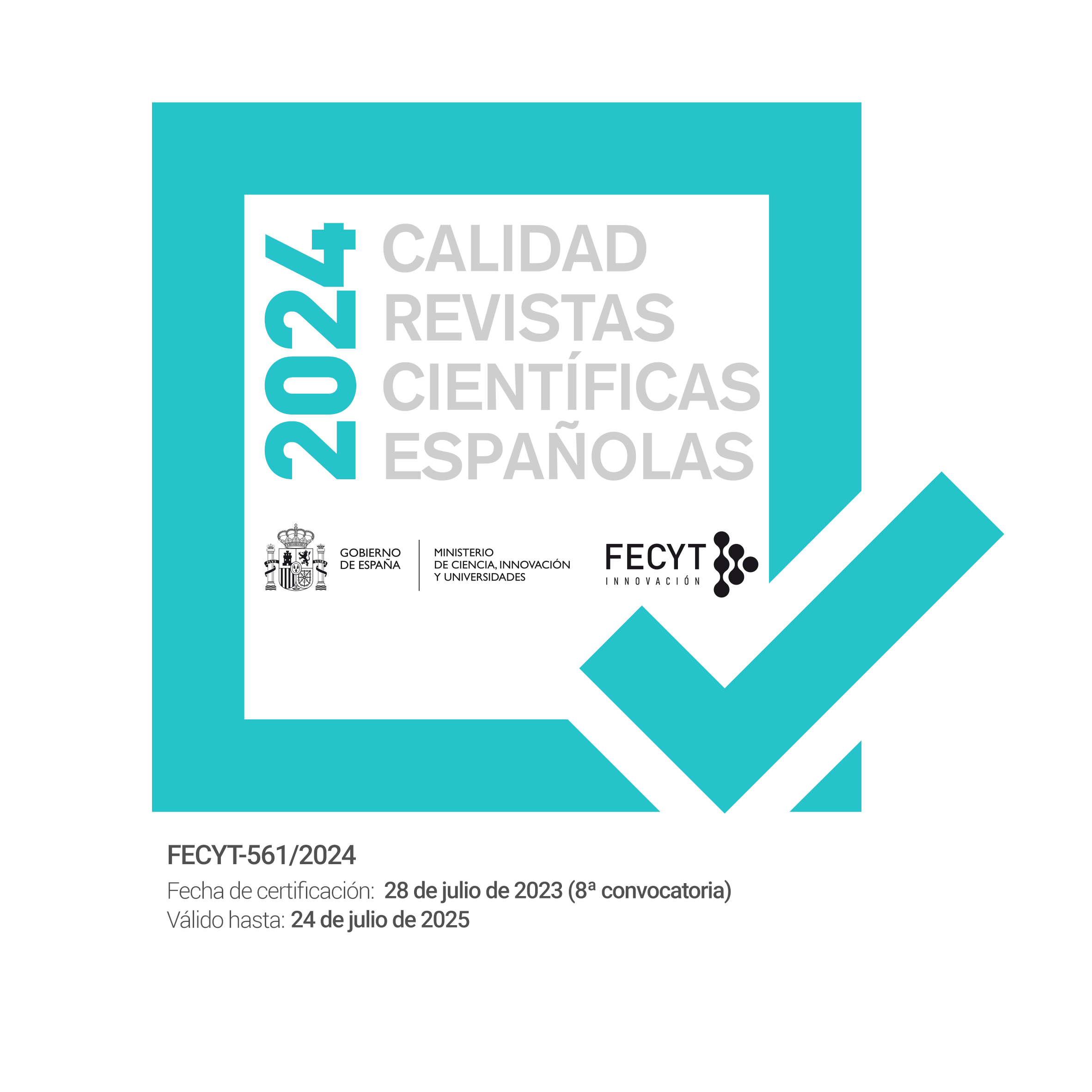Media and social isolation: the consumer experience of virtual entertainment
DOI:
https://doi.org/10.12795/Ambitos.2021.i54.06Keywords:
consumer experience, lives, virtual entertainment, media, social isolationAbstract
This article aims to analyze the consumer experience of virtual entertainment in times of mandatory social isolation. In this way, the study used, for data collection, a field research based on the thickening strategy, which is composed of three stages (interview, netnography and observation), while, for the treatment of the data, we opted for thematic analysis. The results indicated three important themes, namely: virtual entertainment, media and digital consumer experience. Related to these, fourteen sub-themes were also identified and briefly designated the types of virtual entertainment, the categories of media used and the dimensions of the consumer experience. In general, the participants classified the consumption of lives during the isolation period as satisfactory, since they functioned as a kind of escape valve to go through the controversial and complicated moments of the pandemic. Despite this, they also pointed out some improvements that include the interaction between artists and the public, as well as the virtual structure offered for transmission. In addition to the important managerial implications outlined by the article, as alternatives to leverage attractions of this nature and draw more public attention, the theoretical contributions were also of great relevance, especially for the elaboration of new dimensions of the consumption experience that have not yet been addressed in the literature, such as the dimension of imbued consumption, the interactivity dimension, and the dimension of digital infrastructure.
Downloads
References
Araujo, M. T. M. & Cipiniuk, (2020). A. O entretenimento online – A sociedade espetacular das lives nos tempos de pandemia. Revista Inter. Interdisc. Art&Sensorium, 7(2), 193-206.
Banerjee, D. & Rai, M. (2020). Social isolation in Covid-19: the impact of loneliness. International Journal of Social Psychiatry, 66(6), 525-527.
Bayer, J. B., Triêu, P. & Ellison, N. B. (2020). Social media elements, ecologies, and effects. Annual Review of Pshychology, 71, 4711-497.
Becker, L. & Jaakkola, E. (2020). Customer experience: fundamental premises and implications for research. Journal of the Academy of Marketing Science, 48, 630-648.
Braun, V. & Clarke, V. (2006). Using thematic analysis in psychology. Qualitative rearch in psychology, 3(2), 77-101.
Choi, D. & Noh, G. (2020). The influence of social media use on atitude toward suicide through psychological well-being, social isolation, and social support. Information, Communication & Society, 23(10), 1427-1443.
Danna, M. F. & Matos, M. A. (2006). Aprendendo a observar. Edicon.
Duffy, M. E. (2007). Methodoogical triangulation: a vehicle for merging quantitative and qualitative research methods. Journal of Nursing Scholarship, 19.
Ellison, N. B., Gray, R., Lampe, C., & Fiore, A. T. (2014). Social capital and resource requests on Facebook. New Media Soc., 16(7), 1104-1121.
Fontanella, B. J. B. & Júnior, R. M. (2012) Saturação teórica em pesquisas qualitativas: contribuições psicanalíticas. Psicologia em estudo, 17(1), 63-71.
Godoi, C. K., Bandeira-de-Mello, R. & Silva, A. B. (Orgs.) (2006). Pesquisa qualitativa em estudos organizacionais: paradigmas, estratégias e métodos. Saraiva.
Greenhow, C. & Chapman, A. (2020). Social distancing meet social media: digital tootls for connecting students, teachers, and citizens in na emergency. Information and Learning Sciences, 121(5), 341-352.
Júnior, J. H., de Sousa, L. V. H. A., Santos, W. S., Soares, J. C. & Raasch, M. (2020). “#Fiqueemcasa e cante comigo”: estratégia de entretenimento musical durante a pandemia de Covid-19 no Brasil. Boletim de Conjuntura, 2(4), 72-85.
Keiningham, T., Aksoy, L., Bruce, H. L., Cadet, F., Clennell, N., Hodgkinson, I. R. & Kearney, T. (2020). Customer experience driven business model innovation. Journal of Business Research, 116.
Koeze, E. & Popper, N. (2020). The vírus changed the way we internet. The New York Times, 7 April, disponível em: www.nytimes.com/interactive/2020/04/07/technology/coronavirus-internetuse.html (acessado em: 19 de novembro de 2020).
Latzko-Toth, G., Bonneau, C. & Millette, M. (2017). Small Data, Thick Data: thickenin strategies for trace – based social media research. In: SLOAN, L.; QUAN-HAASE, A. (Org.). The SAGE Handbook of Social Media Research Methods. SAGE Publications.
Liu, D., Wright, K. B., & Hu, B. (2018). A meta-analysis of Social Network Site use and social support. Computer Education, 127, 201-213.
Manthiou, A., Hickman, E. & Klaus, P. (2020). Beyond good and bad: challenging the suggested role of emotions in customer experience (CX) research. Journal of Retailing and Consumer Services, 57.
Matias, T., Dominski, F. H., & Marks, D. F. (2020). Human needs in COVID-19 isolation. Journal of Health Psychology, 25(7), 871-882.
Meyer, C. & Schwager, A. (2020). Understanding Customer Experience. Harvard Business Review, article reprint n. R0702G.
Primo, A. (2020). Afetividade e relacionamentos em tempos de isolamento social: intensificação do uso de mídias sociais para interação durante a pandemia de COVID-19. Comunicação & Inovação, 21(47), 176-198.
Seo, M., Kim, J., & Yang, H. (2016). Frequent interaction and fast feedback predict perceived social support: using crawled and self-reported data of Facebook users. Computer Community, 21, 282-297.
Scafura, B. (2020). Assista-me jogar: uma reflexão sobre o impacto da pandemia de Covid-19 no consumo e produção de conteúdo em plataformas de live streaming. Revista Comunicando, 9(1), 152-171.
Shaikh, A. A., Alharthi, M. D. & Alamoudi, H. O. (2020). Examining key drivers of consumer experience with (non-financial) digital services – Na exploratory study. Journal of Retailing and Consumer, 55.
Souza, L. K. (2019). Pesquisa em análise qualitativa de dados: conhecendo a Análise Temática. Arquivos Brasileiros de Psicologia, 71(2), 51-67.
Statista (2019). Global social networks ranked by number of users. Disponível em: <https://www.statista.com/statistics/272014/global-social-networks-ranked-by-number-of-users/>acesso em: 19 de novembro de 2020.
Vergara, S. C. (2007). Projetos e relatórios de pesquisa em Administração. Atlas, 8. ed.
Xiao, C. (2020). A novel approach of consultation on 2019 novel Coronavirus (COVID-19) – Related psychological and mental problems: structured letter therapy. Psychiatry Investigation, 17(2), 175-176.
Downloads
Published
How to Cite
Issue
Section
License
Copyright (c) 2021 Vanessa Saldanha Pinheiro, Danielle Miranda de Oliveira Arruda, Daniel de Carvalho Bentes

This work is licensed under a Creative Commons Attribution-NonCommercial-ShareAlike 4.0 International License.
Ámbitos. Revista Internacional de Comunicación is an open access journal, which means that all content is freely available at no charge to the user or their institution. Users may read, download, copy, distribute, distribute, print, search or link to the full text of articles, or use them for any other lawful purpose, without seeking prior permission from the publisher or author. This definition of open access is in accordance with the Budapest Open Access Initiative (BOAI).

Unless otherwise noted, all content in the electronic edition is distributed under a "Creative Commons Attribution-NonCommercial-ShareAlike 4.0 International License". You can consult the informative version and legal text of the licence here. This should be expressly stated in this way where necessary.
In case of acceptance of the manuscript, the authors cede the rights of the work for its publication to Ámbitos. Revista Internacional de Comunicación under the Attribution-NonCommercial-ShareAlike 4.0 International license contract (CC BY-NC-SA 4.0). The authors retain copyright and third parties are authorised to copy, distribute and make use of the work, provided they comply with the terms and conditions set out in the licence
- Cite the authorship and the original source of publication (journal, publisher and URL of the work).
- Do not use them for commercial purposes.
- If you remix, transform or create from the material, you must release your contributions under the same license as the original.
More information can be found at https://creativecommons.org/licenses/by-nc-sa/4.0/deed.es


















